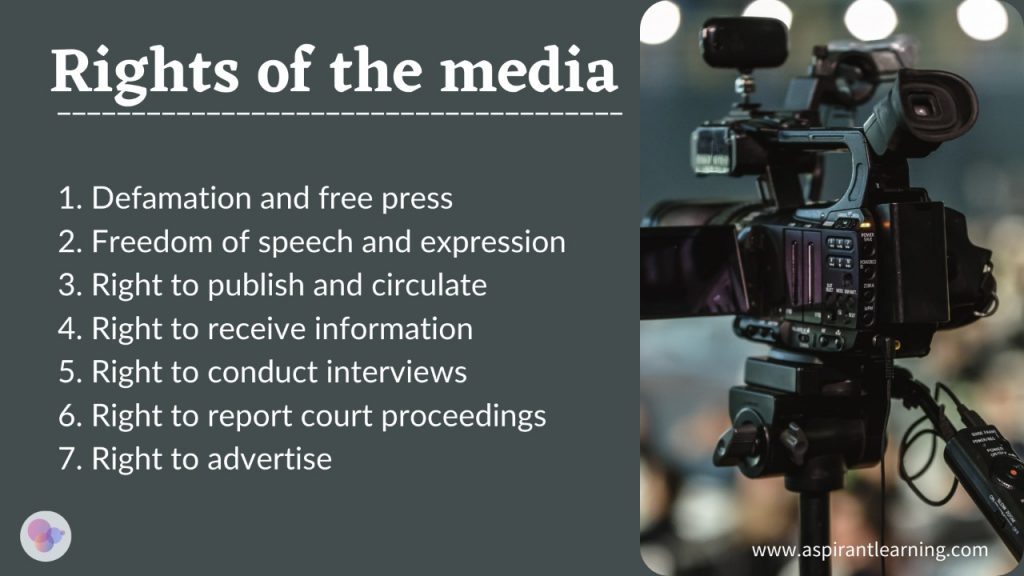News Highlights:
Law on the protection of journalistic sources: Recently, a Delhi court rejecting a closure report filed by the Central Bureau of Investigation said there is “no statutory exemption in India to journalists from disclosing their sources to investigating agencies”.
What have courts said on this issue:
- Freedom of the press:
- While the Supreme Court broadly recognises the freedom of the press, including the right of journalists to ensure the protection of their sources, various courts have ruled differently on this issue.
- Freedom of the press or media refers to the rights given by the Constitution of India under the freedom and expression of speech in Article 19(1)(a).
- It encourages independent journalism and promotes democracy by letting the people voice their opinions for or against the government’s actions.
- One of the fundamental conditions for the media to exercise its right to freedom of speech and expression under Article 19 is the protection of ‘journalistic sources.’
- Protection of journalistic sources:
- The protection of journalistic sources is one of the basic conditions for press freedom.
- Without such protection, sources may be deterred from assisting the press in informing the public on matters of public interest.
- Public interest:
- There is the absence of a specific law on the disclosure of journalistic sources; it is often the discretion of a Court.
- Courts have, in “the public interest, asked journalists to disclose their sources.
- Press Council of India (PCI) Act, of 1978:
- Under the Press Council of India (PCI) Act of 1978, the Press Council has the powers of a civil court to deal with complaints when a newspaper has “offended against the standards of journalistic ethics or public taste or that an editor or working journalist has committed any professional misconduct.
- However, the Council cannot force a newspaper, news agency, journalist, or editor to reveal their sources during the proceedings.
Legal Protection for Disclosure of Journalistic Sources:
- In India:
- In India, there is no specific legislation that protects journalists from being asked to disclose their sources.
- Article 19 of the Constitution guarantees all citizens the right to freedom of speech and expression.
- Like any citizen, a journalist can be compelled to give evidence in Court.
- If she does not comply, the journalist can face charges of Contempt of Court.
- United Kingdom:
- The Contempt of Courts Act 1981 creates a presumption in favour of journalists who want to protect the identity of their sources.
- However, that right is subject to certain conditions in the “interest of justice”.
- The European Court of Human Rights, in a landmark 1996 ruling, held that an attempt to force a journalist to reveal his source for a news story violated his freedom of speech and expression guaranteed under the European Convention on Human Rights.
- United States:
- Although the First Amendment guarantees free speech, the United States mentions the press explicitly.
- The Supreme Court has held that journalists do not have the right to refuse to testify in a federal grand jury proceeding and disclose sources.
- This was in a 1972 ruling, Branzburg v. Hayes. Several journalists have been imprisoned for refusing to disclose their sources.
- However, several states in the US have “shield laws” that protect the rights of journalists to varying degrees.
- Sweden:
- The Freedom of the Press Act in Sweden is a broad protection of the rights of journalists and even extends to state and municipal employees who might share information with journalists freely.
- In fact, a journalist who reveals his or her source without consent may be prosecuted at the behest of the source.
- In France and Germany:
- In France and Germany, too, journalists can refuse to disclose sources in an investigation.
Recommendations for a change in the law:
- The Law Commission report:
- The Law Commission of India, in its 93rd Report in 1983, recommended recognising journalistic privilege by amending the Indian Evidence Act.
- The report suggested the insertion of a new provision which would read: “No court shall require a person to disclose the sources of information contained in a publication for which he is responsible, where such information has been obtained by him on the express agreement or implied understanding that the source will be kept confidential”

Why is freedom of the press important:
- Exchange ideas and thoughts:
- The press inspires people to think beyond the social norms and gives a platform to exchange ideas and thoughts that deserve to be heard by people around the nation.
- Press make sure justice is served:
- Often, people try to cover up their actions and settle a case without bringing the media into it.
- The press brings to light such situations and ensures that justice is served correctly with the backing of the ordinary people.
- Speaks thoughts of people:
- The press acts as a channel that writes and speaks most people’s thoughts.
- It focuses on suppressed issues and brings forward the ones that should be discussed.
- The fourth pillar of democracy:
- Since the media is an independent body that challenges the Government, it can be referred to as the fourth pillar of democracy alongside the government’s judiciary, legislative and executive bodies.
Pic Courtesy: Freepik
Content Source: The Indian Express



